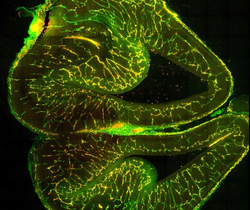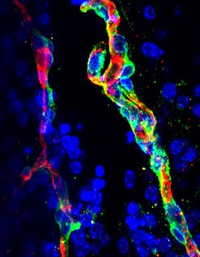The brain and its surrounding blood vessels exist in a close relationship. The vessels supply the energy-hungry neuronal cells with nutrients. Researchers from the University of Freiburg and the Max Planck Institute of Immunobiology and Epigenetics have now discovered how cells of the blood vessels sense the metabolic condition of the brain and alter vascular function in response. The result could be important for patients with neurodegenerative disorders such as Alzheimer’s or vascular dementia because the onset of these age-related diseases coincides with vascular defects and breakdown of vascular function in the brain.
The brain is our most energy-hungry and metabolically active organ. It is responsible for our thoughts, ideas, movement and ability to learn. Our brain is powered by 600 km of blood vessels that bring it nutrients and remove waste products. However, the brain is also very fragile. Thus, the blood vessels in the brain have evolved to form a tight protective barrier – the blood–brain barrier – that restrict the movement of molecules in and out of the brain. It is essential that the brain can regulate its environment. On the one hand, pathogens or toxins are effectively prevented from entering the brain, but on the other hand, required messengers or nutrients can pass through them unhindered.







